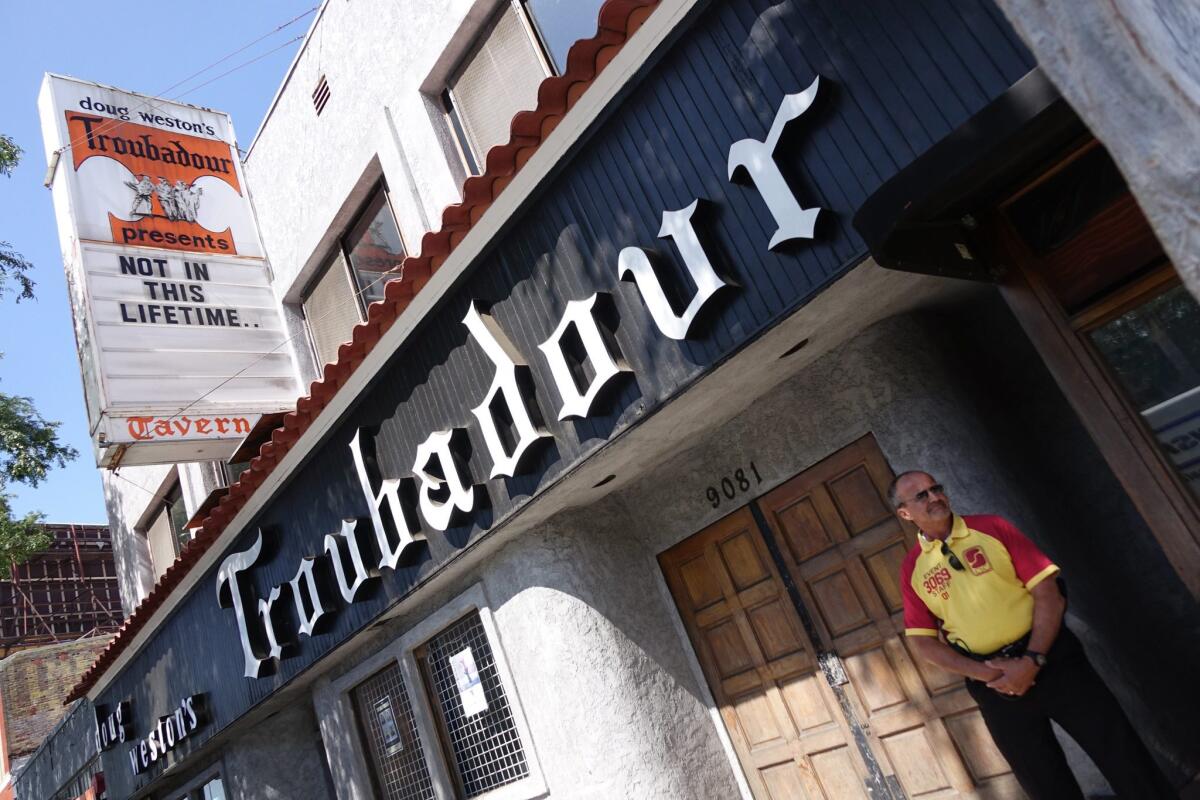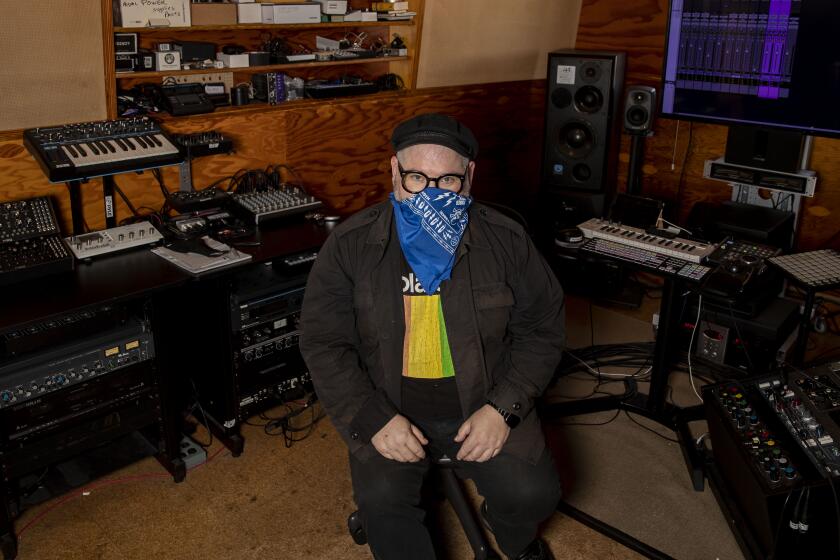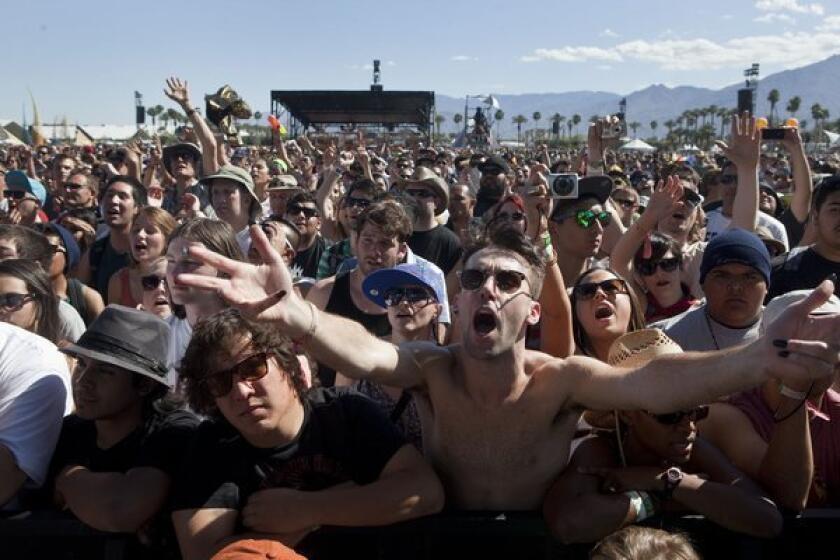Historic Troubadour nightclub launches GoFundMe page, calls survival ‘a big if’

- Share via
For 60 years, the historic club the Troubadour has anchored the western edge of West Hollywood with live music. A perennial presence in Los Angeles live music since the beatnik era, the club opened by Doug Weston has provided thousands of artists the opportunity to make magic on hallowed ground.
But as Gov. Gavin Newsom was recently laying out the stages by which businesses may be able to re-open, Christine Karayan, the club’s general manager, realized the seeming futility of the Troubadour’s plight. Newsom has announced that music venues will be among the last to open, in Phase 4.
“That means the middle to the end of next year to potentially open, and maybe a 25% cap” on crowd size, Karayan says. “I can’t foresee being able to ride this out like that.”
Stars from the Doors to Prince recorded at Sunset Sound. Now, the studio is closed for the first time in 60 years, joining hundreds of others shuttered across L.A.
A rustic general admission room with a small balcony and an upstairs VIP area, the 500-capacity club’s selling point has long been its intimacy. Save a few pesky support beams, there’s not a bad spot in the place. A folk and blues venue to start, in the mid-1960s it started adding rock, jazz and pop acts that included rising artists such as the Byrds, Lee Hazlewood, Nina Simone and Judy Collins. It served as a crucial early comedy platform for Richard Pryor, Steve Martin and the Smothers Brothers.
Though it’s a tourist destination, its location just south of the Sunset Strip has made it a kind of neighborhood spot for musically minded Hollywood Hills, Beverly Hills and Hollywood residents.
Starting in the late ‘60s, the Troubadour helped guide artists including Joni Mitchell, Linda Ronstadt, Jackson Browne, James Taylor, Tom Waits, the Eagles and Warren Zevon into the mainstream. Most famously, it was on the Troubadour’s stage in 1970 that a 20-year-old Elton John, across a series of shows, became a household name. That moment was captured in the recent John biopic, “Rocketman.”
“My whole life came alive that night, musically, emotionally... everything,” Elton John told The Times a few decades after those auspicious performances. “It was like everything I had been waiting for suddenly happened.... I could tell it was a magical night from the moment I stepped onstage.”

In the decades since, the Troubadour has remained defiantly independent. As other clubs shuttered or made booking arrangements with moneyed promoters such as Live Nation and AEG, the Troubadour has charted its own course — and continued booking standing-room-only gigs. “My last four talent buyers, actually, have all gone to Live Nation,” Karayan says with a fatalistic chuckle. “I’m the training ground, apparently.”
Outsiders commonly think of the Troubadour as a folk and singer-songwriter venue, but across the decades it has adapted and evolved. In the ‘80s, as heavy metal ripped through Southern California, the Troubadour served as a stage for early gigs by Slayer, Metallica and Motley Crue. In the 1990s and ‘00s, the club hosted Brit pop, grunge and alt-rock: Foo Fighters, Queens of the Stone Age, Melvins, Dave Matthews, the White Stripes, Bon Iver and Weezer all played beneath the club’s iconic neon sign on their ascents to main stages.
The Troubadour brand in Los Angeles is so embedded into music culture that many fans misunderstand the mechanics of the club, Karayan says. Describing it as “a little bit forgotten,” Karayan says, “We’re lumped in with the big boys, and we’re not the big boys. We don’t have shareholders. We don’t have corporate money. We are what we are.”
Epidemiologists and government officials agree that large-scale concerts and festivals can’t be safely held until 2021, a crushing blow.
Karayan’s father, Ed Karayan, owns both the club and the building that it’s housed in. He’s been sole caretaker since his former business partner Weston died in 1999. The club leases neighboring offices and storage space at market value, and insurance premiums are exorbitant.
Listing the costs, Karayan pauses. “The more I think about it, it’s just completely futile. At least a big seated venue has space where they can keep people apart. But I don’t know how that works for a general admission venue. Are you going to stop them from using the restroom?”

Like most proprietors, at first Karayan figured that the pandemic would prompt some temporary belt-tightening. She remembers her mind set: “At first, it was, ‘What is happening?’ And then we started canceling shows.”
The last gig was Glass Animals on March 11. YouTube videos show the band’s singer, Dave Bayley, singing from up in the balcony before moving his way through the VIP area and back onto stage. The place was packed. The next day, doom set in, Karayan says. “When we walked into the office on March 12, I thought, ‘Something horribly wrong is coming our way.’” So she decided to cancel shows through May. “And then it just started unraveling.”
When she read a month ago that Live Nation and AEG were predicting a fall 2020 reopening, Karayan was relieved. “I was like, ‘We can do that. We probably won’t have concerts until the end of the year, but it’s OK.” But, she adds, “Now it’s like, ‘Oh, I’m sorry. We’re talking, potentially, the middle of next year.’”
As an active member of the National Independent Venue Assn., she’s communicating with its 800 affiliates about lobbying for government aid. She says that many have expressed doubt that they’ll be able to survive an extended closure without immediate help.
Like many businesses, the Troubadour set up a GoFundMe page to help its 20 hourly employees, some of whom have worked at the club for decades, meet their needs. All but three have been laid off. To date, the campaign has raised $11,400 of its $30,000 goal. But that was a stopgap measure, and Karayan said the club will soon be raising its goal to underscore the urgency. It’s one of the only remaining options.
“It looks tacky, but it’s a reality at this point. It’s not a joke,” she says. “If we’re going to survive this thing — and that’s a big if — we’re going to need all the help we can get, from any direction we can get it.”
Whether that aid comes from one of the many multi-millionaires who owe their fortunes, in part, to momentous gigs at the Troubadour, or through the thousands of fans with once-in-a-lifetime memories, response to the Troubadour’s ask will likely determine whether that Glass Animals gig was the last show at the club.
“We know there’s going to be a huge fatality rate as far as how many venues will not be able to open again when/if this thing ever ends,” Karayan has concluded. “We’re just looking to survive, like everybody else.”
More to Read
The biggest entertainment stories
Get our big stories about Hollywood, film, television, music, arts, culture and more right in your inbox as soon as they publish.
You may occasionally receive promotional content from the Los Angeles Times.













